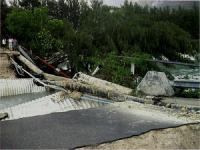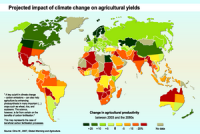-
Rising seas disrupt local economies
Impacts from climate change are not always easy to see. But for many local businesses in coastal communities across the United States, the evidence is right outside their doors – or in their parking lots. High-tide flooding resulting from climate change is already disrupting the economy of Annapolis, Maryland. As sea levels rise, the impacts are expected to get worse for coastal communities.
-
-
Developing a system to identify, patch software security holes
DARPA is funding research of security vulnerabilities in web software. A new system called GAMEPLAY (for Graph Analysis for Mechanized Exploit-generation and vulnerability Patching Leveraging human Assistance for improved Yield) will spot security weaknesses in the millions – sometimes billions – of lines of code that run websites including banking and online shopping which are attractive to hackers.
-
-
Keeping the lights on during and after a disaster

The threat of an inevitable earthquake is the uncomfortable truth we all face in the Cascadia Subduction Zone, which stretches from Alaska to California. Because the last major earthquake in the area was in the 1700s, our infrastructure developed without an appreciation and understanding of earthquake resilience. That means the next major earthquake will likely devastate our buildings, roads, bridges, and utility providers, posing immediate risks for the health and safety of those who live in the region. And later, there will be long-term economic aftershocks.
-
-
Paradigm shift needed for making bridges tsunami-resistant

Over the past fifteen years, big earthquakes whose epicenters were in the ocean off the coasts of Japan and Indonesia have caused tsunamis that killed more than 250,000 people and caused more than $200 billion in damage. The damage includes washing away or otherwise dislodging hundreds of bridges, emphasizing the need to better understand the wave impacts’ underlying physics. Researchers argue in a new study that a paradigm shift is needed for assessing bridges’ tsunami risk.
-
-
In one generation, climate of North American cities will shift hundreds of miles

In one generation, the climate experienced in many North American cities is projected to change to that of locations hundreds of miles away—or to a new climate unlike any found in North America today. New web application helps visualize climate changes in 540 North American cities.
-
-
Russia, China threaten U.S. space dominance: Pentagon
The Defense Intelligence Agency (DIA), the Pentagon’s lead intelligence agency, has warned that Russia and China are building technologies which will soon threaten U.S. dominance in space. Both countries “are developing a variety of means to exploit perceived U.S. reliance on space-based systems and challenge the U.S. position in space,” the report said. Russian doctrine “involves employing ground, air, and space-based systems to target an adversary’s satellites, with attacks ranging from temporary jamming or sensor blinding to destruction of enemy spacecraft and supporting infrastructure,” the report said.
-
-
Reform of U.S. skilled-worker visa program wins praise
The Trump administration’s new rules for a U.S. visa program widely used for technology workers are getting cautious praise from Silicon Valley amid surging demand for high-skill employees. The H-1B visa program, which admits 85,000 foreign nationals each year, will give higher priority to people with postgraduate degrees from U.S. universities, under a final rule the Department of Homeland Security published in January.
-
-
2018 fourth warmest year in continued warming trend
Earth’s global surface temperatures in 2018 were the fourth warmest since 1880, according to independent analyses by NASA and the National Oceanic and Atmospheric Administration (NOAA). Global temperatures in 2018 were 1.5 degrees Fahrenheit (0.83 degrees Celsius) warmer than the 1951 to 1980 mean. Globally, 2018’s temperatures rank behind those of 2016, 2017 and 2015. The past five years are, collectively, the warmest years in the modern record.
-
-
Lawmakers tell Pentagon to redo climate change report
Earlier this month, the Pentagon, in compliance with a congressional mandate, released a landmark report which identified the 79 American military installations most vulnerable to the “effects of a changing climate.” Several Democrats on the House Armed Services Committee welcomed the report – but at the same time harshly criticized it for failing to include details requested by Congress, among them the estimates by each of the armed services of the cost of protecting or replacing the ten most vulnerable military bases.
-
-
Rising seas: to keep humans safe, let nature shape the coast
Even under the most conservative climate change scenarios, sea levels 30cm higher than at present seem all but certain on much of the U.K.’s coast by the end of this century. Depending on emission scenarios, sea levels one meter higher than at present by 2100 are also plausible. The knee-jerk reaction to sea level rise has traditionally been to maintain the shoreline’s position at all cost, by building new flood defense structures or upgrading old ones, but this traditional approach of “grey” engineered sea defenses locks society into ever increasing costs of replacement and maintenance. The alternatives are “nature-based solutions” to coastal flooding and erosion, which work with natural processes to reduce flood risk and incorporate ecosystems into flood defense.
-
-
Diffusing the methane bomb
The Arctic is warming twice as fast as the rest of the planet, causing the carbon containing permafrost that has been frozen for tens or hundreds of thousands of years to thaw and release methane into the atmosphere, thereby contributing to global warming. The findings of a study that included researchers from IIASA, however, suggest that it is still possible to neutralize this threat.
-
-
Artificial Intelligence to make life harder for hackers
As the volume of digital information in corporate networks continues to grow, so grows the number of cyberattacks, and their cost. One cybersecurity vendor, Juniper Networks, estimates that the cost of data breaches worldwide will reach $2.1 trillion in 2019, roughly four times the cost of breaches in 2015. Now, computer scientists have developed a tool that could make it harder for hackers to find their way into networks where they don’t belong.
-
-
Under-road heating system to keep Europe’s highways ice-free
Snow and ice can dramatically change the conditions of a road, where slippery surfaces make it harder to keep control of a vehicle, particularly when braking or turning. Under-road heating that melts ice and snow within 15 minutes and real-time information about icy road conditions could help prevent wintertime accidents.
-
-
New approach to defeating superbugs
Researchers have developed a new way to identify second-line antibiotics that may be effective in killing germs already resistant to a first-line antibiotic – potentially helping overcome antibiotic resistance. This new research – based on tackling antibiotic resistance via existing drugs (with a twist) — provides an approach clinicians could consult when deciding which antibiotic treatment courses will be most effective for patients.
-
-
Want to squelch fake news? Let the readers take charge
Would you like to rid the internet of false political news stories and misinformation? Then consider using — yes — crowdsourcing. That’s right. A new study co-authored by an MIT professor shows that crowdsourced judgments about the quality of news sources may effectively marginalize false news stories and other kinds of online misinformation.
-
More headlines
The long view
The Future of Open Data in the Age of AI: Safeguarding Public Assets Amid Growing Private Sector Demands
AI offers immense potential, but that potential must be realized within a framework that protects the public’s right to its own information. The open data movement must evolve to meet this new challenge—not retreat from it.
Horses for Courses: Where Quantum Computing Is, and Isn’t, the Answer
Despite the impressive and undeniable strides quantum computing has made in recent years, it’s important to remain cautious about sweeping claims regarding its transformative potential.
Federal R&D Funding Boosts Productivity for the Whole Economy − Making Big Cuts to Such Government Spending Unwise
Large cuts to government-funded research and development can endanger American innovation – and the vital productivity gains it supports. If the government were to abandon its long-standing practice of investing in R&D, it would significantly slow the pace of U.S. innovation and economic growth.
Why Ukraine’s AI Drones Aren’t a Breakthrough Yet
Machine vision, a form of AI, allows drones to identify and strike targets autonomously. The drones can’t be jammed, and they don’t need continuous monitoring by operators. Despite early hopes, the technology has not yet become a game-changing feature of Ukraine’s battlefield drones. But its time will come.
New Tech Will Make Our Airplanes Safer
Odysight.ai’s technology allows for constant monitoring of aircraft, sending alerts in case of malfunctions that could lead to accidents.
New Technology is Keeping the Skies Safe
DHS S&T Baggage, Cargo, and People Screening (BCP) Program develops state-of-the-art screening solutions to help secure airspace, communities, and borders
